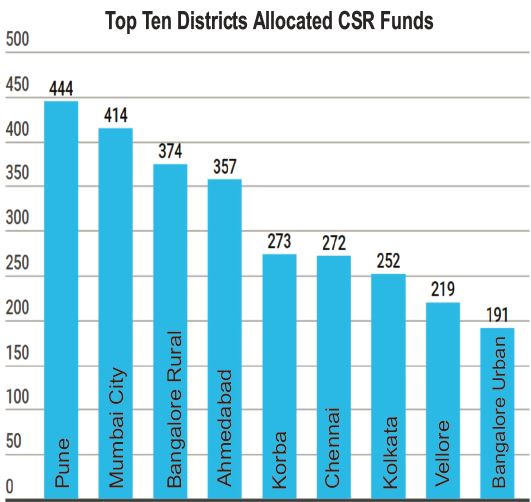CSR Ecosystem Must Introspect on Partisan Implementation

Your passport reads – “Republic of India” and “Bharat Ganarajya” – written in Roman and Devanagri script respectively, clearly depicting the two names of the same country. The Indian Constitution says, “India that is Bharat” in Article 1, identifying India and Bharat as one entity. However, in popular culture, Bharat is not India. Bharat lives in villages, while India resides in cities. Bharat is farms and suicides, and India is high rises and opulence. NRIs return to India and not Bharat, and unemployed youth migrate to India; leaving Bharat behind.


In 2013, when the Government of India directed companies to spend two percent of their net profits towards social development activities through CSR, Bharat thought it would soon become India. After about four years of this legislation, has it happened?
Corporate India – as per the Ministry of Corporate Affairs(MCA) – has spent more than INR 28,000 Crores on CSR during the period from April 2014 to November 2017.
 A report shows that Maharashtra has received the biggest chunk of the total CSR fund spent in the country. It will be amusing for readers to know that Pune district tops the chart with the inflow of around INR 444 crore, followed by Mumbai City district (INR 414 crore), Bangalore rural district (INR 374 crore) and Ahmedabad district (INR 357 crore). Also, 1/3rd of India’s total CSR spend is received by a mere four States- Rajasthan, Karnataka, Gujarat and Maharashtra – out of which three (barring Rajasthan), are the most developed States. Maharashtra is set to receive over Rs.7,400 Crore development sector boost through CSR.
A report shows that Maharashtra has received the biggest chunk of the total CSR fund spent in the country. It will be amusing for readers to know that Pune district tops the chart with the inflow of around INR 444 crore, followed by Mumbai City district (INR 414 crore), Bangalore rural district (INR 374 crore) and Ahmedabad district (INR 357 crore). Also, 1/3rd of India’s total CSR spend is received by a mere four States- Rajasthan, Karnataka, Gujarat and Maharashtra – out of which three (barring Rajasthan), are the most developed States. Maharashtra is set to receive over Rs.7,400 Crore development sector boost through CSR.
“Are companies choosing convenience of implementation over the real needs on the ground? Are they prioritising the needs of the communities? Or are they planning their CSR interventions to fulfil their global mandate?”
The most developed parts of our country are the recipients of the largest share of CSR funds. On the other hand, 19 districts of Jharkhand that are enlisted as most backward districts in the country, have not received any CSR funds till date.
Sounds ironical? Let’s assess why.
India being a developing country – the need for social development interventions is omnipresent. There is a plethora of issues that our communities are facing which needs to be addressed. And these issues – be it lack of sanitation facilities, access to affordable healthcare or denial of basic human rights – knows no geographical boundaries such as rural or urban. Only the magnitude and spread varies. In such a scenario, companies have a vast choice of locations and cause areas to intervene and bring about change.
That brings us to discuss – how do companies choose the locations to implement their CSR programmes and causes to support?
Are companies choosing convenience of implementation over the real needs on the ground? Are they prioritising the needs of the communities? Or are they planning their CSR interventions to fulfil their global mandate? A deep-dive approach will help the programmes to become more sensitive towards the needs. Needs are everywhere. Hence the efforts and investments also should align with the gravity of the issues. Companies need to move beyond their boundaries and assess the requirements and incorporate bottom-up approach in their CSR journeys.
Many NGOs or organisations working at ground zero are denied CSR funds by companies since their work is ‘not within a respectable distance from the companies’ offices.
While it is understandable that corporate entities prefer to work in the vicinity of their factories or offices for brand-building and giving back to the community they may have taken something from, the resultant concentration of CSR funds in and around cities leaves the vast majority of the country without any financial support. Many NGOs or organisations working at ground zero are denied CSR funds by companies since their work is ‘not within a respectable distance from the companies’ offices. Companies normally prefer to limit their CSR activities within the radius of about 30 to 50 kilometres from their factories of offices’.
 For companies, it is in their strategic interest that they invest their CSR funds limiting to their areas of operations. However, the negative impact of limiting CSR funds to certain geographies is all too visible. For example, large parts of backward rural districts of Maharashtra, Andhra Pradesh, Madhya Pradesh and Uttar Pradesh have been facing a severe drought in this decade. Yet, it is mostly areas in Maharashtra that received corporate support, even though an equally severe drought was taking a toll on Bundelkhand in Uttar Pradesh.
For companies, it is in their strategic interest that they invest their CSR funds limiting to their areas of operations. However, the negative impact of limiting CSR funds to certain geographies is all too visible. For example, large parts of backward rural districts of Maharashtra, Andhra Pradesh, Madhya Pradesh and Uttar Pradesh have been facing a severe drought in this decade. Yet, it is mostly areas in Maharashtra that received corporate support, even though an equally severe drought was taking a toll on Bundelkhand in Uttar Pradesh.
Having a credible and experienced implementation partner is critical for any company to deliver impact on ground through its CSR programmes. Hence, companies find it easier to join hands with well-known and large NGOs. This essentially leads to dearth of CSR funds for grassroots NGOs who are closest to the neediest communities. This results in concentration of funds where the large NGOs operate. Companies need to explore the expertise at ground zero by conducting thorough due diligence of the grassroot NGOs and partnering with them to focus on backward geographies.
“It is not only the locations, but Corporate India is biased towards the causes that it supports through CSR. MCA data shows that a big chunk of the CSR money which is almost 75 percent, is allocated to only three cause areas – education, health (including sanitation and water) and rural poverty alleviation. However, Schedule VII of Section 135 of The Companies Act 2013, mentions several more causes that the companies can support. This leads to several questions which the companies must attempt to ponder over. Is there some duplication of efforts and resources that can be arrested?”
CSR teams in companies are generally small who execute their budgets through on-ground partners. Hence, convenience of monitoring is one of the most important parameters for these companies when deciding locations for the CSR programmes. Programme management is a very time and effort-intensive activity which requires enough human resources – both on and off ground. With changing times, technology will be a boon for companies to optimally use their human resources for CSR. Technology can help companies to monitor programmes even in remote locations, at the click of a button and take prompt decisions. By leveraging technology platforms to design, manage and monitor CSR programmes, companies can now explore untouched geographies that are the neediest and least served in India.
It is not only the locations, but Corporate India is biased towards the causes that it supports through CSR. MCA data shows that a big chunk of the CSR money which is almost 75 percent, is allocated to only three cause areas – education, health (including sanitation and water) and rural poverty alleviation. However, Schedule VII of Section 135 of The Companies Act 2013, mentions several more causes that the companies can support. This leads to several questions which the companies must attempt to ponder over. Is there some duplication of efforts and resources that can be arrested? Are there opportunities to learn from peers and their own experiences and take them to unexplored geographies to catalyse social change there? Are there synergies that can be drawn between the work undertaken by local community-based organisations (CBOs) at remote locations and companies’ CSR agenda? The CSR ecosystem needs to analyse what is stopping them to widen their social impact horizons.
The Companies Act 2013, Sec. 135 mentions that, “the company shall give preference to the local area and areas around where it operates, for spending the amount earmarked for Corporate Social Responsibility activities”. Having said that, companies in India are located only in a few major cities such as Mumbai, Delhi and Bengaluru. If one must only align with the recommendation from Sec. 135, large parts of ‘Bharat’ will be denied any benefit of CSR funds of companies located in ‘India’. Companies – by ignoring Bharat from their CSR agenda– are losing a great opportunity to not only contribute towards the development goals, but also to develop rural markets for their products and goodwill for their brand. Businesses need to sync their CSR agendas with the real needs on the ground to create a tangible impact.
Richa Bajpai and Abhishek Humbad are Founders and Co-CEOs at Goodera

